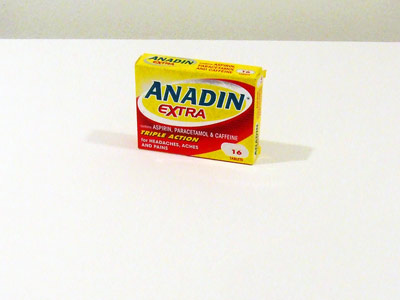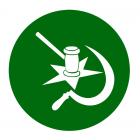joint projects
Lot 3


Medication
Licensed by Wyeth Consumer Healthcare
Quantity: 16 tablet pack
Ingredients: Aspirin BP, Paracetamol, Ph Eur, Caffeine Ph Eur (maize starch, E460, hydrogenated vegetable oil, E464, polyethylene glycol, pregelitanised starch, povidone)
One of the many curiosities of the late capitalist period was the way in which populations were controlled via medication and health policies. This was carried out by governments on behalf of major pharmaceutical companies.
The fact that profit regulated the access to healthcare may seem criminal to us today, but it was an accepted fact in almost all societies. In many cases, mass produced medicines were often only circulated within economically powerful countries as their producers viciously defended their ‘patents’ stopping the replication of effective medicines at lower costs.
It was also common practice to invent imminent pandemics and imaginary diseases and then sell to the ‘patients’ and those in charge of health delivery systems, the ‘medicines’ to combat them.

Provenance
Sir Roy Anderson is one of the UK government’s leading advisors on swine flu, and is part of the government’s Scientific Advisory Group for Emergencies. He was one of the first scientists to label the 2009 swine flu outbreak a pandemic.
As well advising the government on swine flu, Anderson is also a paid board member of the pharmaceutical giant GlaxoSmithKline (GSK), which is selling swine flu vaccines to the UK government. GSK also makes Relenza, an alternative to the anti swine flu drug, Tamiflu.
In a radio interview in May, Anderson strongly supported the mass use of anti swine flu drugs and called for their distribution.1 Listeners were not told of his financial relationship with GSK.
Anderson receives £116,000 a year for his position at the company, with at least a quarter of his salary being paid in shares.2 GSK’s share price rose 10% in the two months from May and in July 2009 it posted profits of £2.1 billion pounds for the past three months.
Pharmaceutical profits are among the highest of any commercial sector and the combined value of the world’s top five drug companies is twice the Gross National Product of all sub-Saharan Africa.3 As the UK’s biggest export earner after North Sea oil, the industry has tremendous economic and political power.
In August, the UK government rejected advice from other swine flu experts on the widespread use of anti swine flu drugs. By making the drug widely available now, they said, the government could be doing more harm than good.4 Resistance to the drug could develop, making it useless to fight any future and potentially more serious pandemic flu strain.
Despite these warnings and calls for the national swine flu helpline to be shut down, the government has continued with its programme of mass prescription.
1 Roy Anderson on Radio 4’s Today programme, 1 May 2009
2 David Derbyshire, Government virus expert paid £116k by swine flu vaccine manufacturers
GSK, Daily Mail, 27 July 2009
3 Emma Miller, Reaping Profits from Disease Mongering, www.spinwatch.org, 28 June, 2005
4 James Sturcke, Experts warned dispersal of Tamiflu would do more harm than good, The Guardian, 16 August 2009